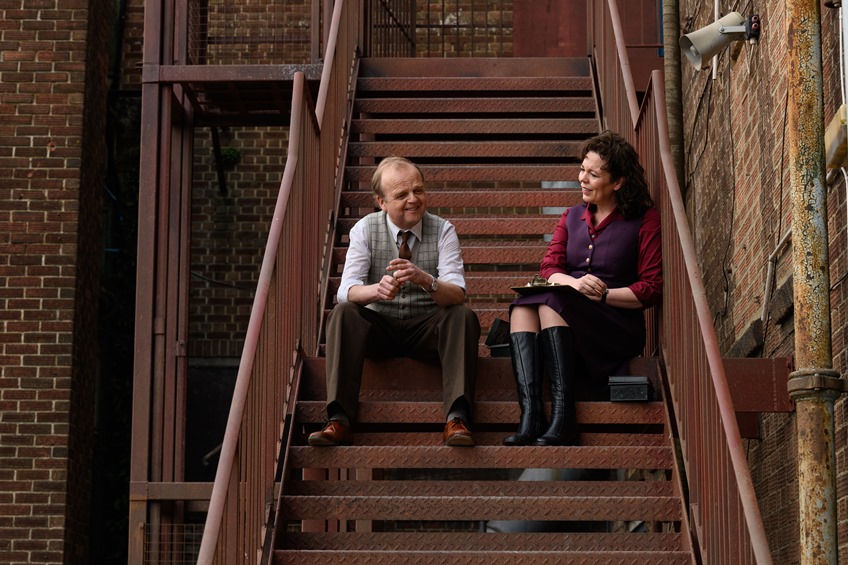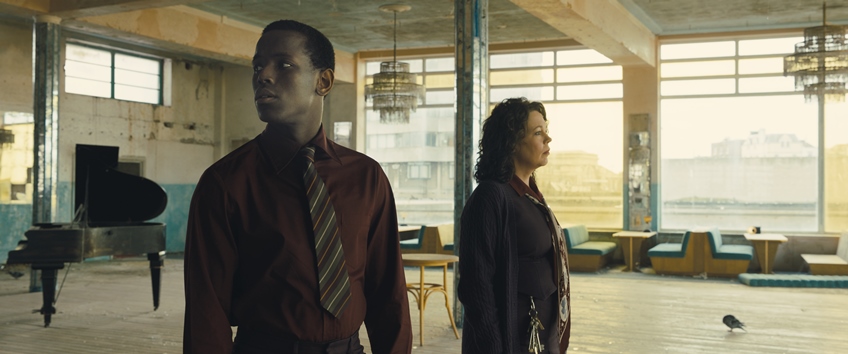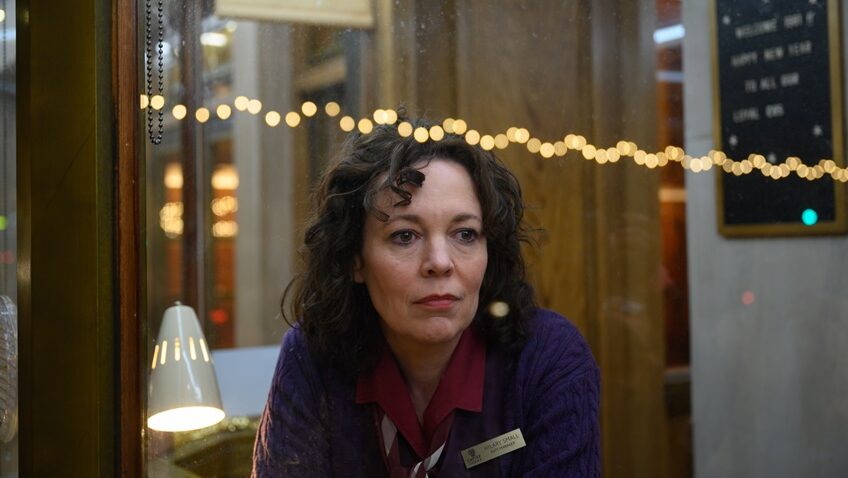Joyce Glasser reviews Empire of Light (January 9, 2023) Cert 15, 113 mins.
Sam Mendes is an acclaimed artistic and theatre director who made the successful transition to film director at 34 in a big way, winning an Academy Award for Best Director (and best film) for his debut feature, American Beauty. His stint at directing James Bond (Skyfall and Spectre) took the hero and the series in a new direction. But until his most recent film, 1917, he interpreted other people’s scripts as he did in the theatre. In Empire of Light, an ambitious, big, big-hearted, passionate, topical film set in a seaside cinema, he wrote the script and it’s a mess.
Olivia Colman is the big draw in another terrific performance. She plays Hilary Small, a middle-aged duty manager at a seaside town’s once grand picture palace, now half boarded up and struggling with the popularity of colour television and the 1970s and 1980s club scene to fill seats to lonely singles and oddballs. She might have once enjoyed talking with the cinema director Donald Ellis (Colin Firth), a respected local businessman, married to a socialite, but now she reluctantly gives in to his demands for a quickie in his office in between shows.
One night she is in a restaurant drinking wine and reading a book while awaiting her meal when Donald comes in with his wife. Hilary leaves. A glimpse of her nearby flat where she lives alone and a trip to the doctor suggest that Hilary has mental health issues and is on prescription medication or should be…
This routine is broken by the arrival of Stephen (Michael Ward), a handsome student who lives with his single mother Delia (Tanya Moodie), a nurse determined to see her son go to university. The job at the Empire of Light cinema is temporary. It is still curious that, with one exception, no one in this film has gravitated toward the job for their love of cinema and chance to see films for free. Olivia has never seen a film and the other employees do not talk about cinema.

That exception is the ubiquitous Toby Jones as Norman, the projectionist. Although Mendes has admitted the character of Hilary is based on his mother who suffered from schizophrenia, when Norman waxes lyrical about the cinema, it’s Mendes talking. He might also be talking to the Film Academy that loves movies about cinema, like his competition in that department this year, Spielberg’s autobiographical coming of age movie, The Fabelmans.
Despite their age gap, Hilary and Stephen are kindred souls, exploring the locked up rooms in the cinema, and discovering a wounded pigeon that Stephen brings back to life by mending his wing. The pigeon is a potent symbol. Plays from A Doll’s House to The Iceman Cometh to The Seagull thrive on symbolism, but in cinema, a more subtle medium, they have to be used sparingly and lightly.
Hilary is the damaged, vulnerable bird, unable to fly due to illness, and left to die alone until Stephen, a man as sensitive as she is, comes along to heal her. Stephen is Black and when the racial tension that sparked the contemporaneous 1981 Brixton riots reaches the southern shore (the film was shot in Margate) Hilary is aware that Stephen has his own crosses to bear. There is a truly frightening scene in which National Front thugs surround the cinema. The staff manage to close its glass door, and the staff are huddled inside awaiting the worst or the police.
As the relationship between Stephen and Hilary turns romantic, both characters reflect their newfound happiness and companionship. But it is revealed that Hilary has a history of mental illness and took a sabbatical from the theatre to recover. And Stephen is reunited with an attractive black woman from his past who pursues him. They begin seeing one another.

Hilary’s illness flares up after she refuses to see the boss in his office, Donald’s not-so-subtle signal to Hilary, which the rest of the staff are now aware of. The cinema has won the privilege to host the national premiere of Chariot’s of Fire (the March 1981 Royal Premiere was held at the Haymarket, London), a coup for Donald as the presence of celebrity guests will result in publicity for the cinema.
Hilary crashes the premiere, however, and delivers a semi-incoherent speech with lipstick on her teeth ranting about the importance of “the community black or white” followed by a reading from Auden. When she leaves the stage she confronts Donald in front of his clueless wife (Sara Stewart) dressed to the nines.
Here is a missed opportunity. Since Chariots of Fire raises the issue of antisemitism the well-read Hilary could have made a speech that tied in the racism she has witnessed with the movie’s theme, in a plea for tolerance which would have included mental illness. Why choose Chariots of Fire in a film about racism and give Hilary a sermon if you are not going to make that connection?
Stephen is attacked by skinheads and lands in the same hospital where Delia works as a nurse. Hilary, now out of the mental hospital, visits him and the two women meet in a touching encounter that strengthens Hilary, at a low point in her life.
You can have a film about the relationship between an older, white woman with schizophrenia and a younger black man who is the target of racism, but you have to decide whose story this is. As for the theme of cinema, it is there but not being tied into the plot and characters intrinsically, it seems like a remnant from a first draft script in which the story being told unfolds like a Douglas Sirk melodrama.
It isn’t until the very end of the film that Hilary asks Norman to show her a film. She watches, transfixed, as though she were Rip Van Winkle just waking up. But here, the symbolism lets us down just when it could cement the disparate elements of the script. Norman chooses Being There by Hal Ashby whose protagonist is a simple minded man, wrongly suggesting the link between mental illness and simple mindedness. Moreover, the protagonist has learned everything he knows from television, the opposite of Hilary.
At the end of the film Mendes is mixing his metaphors again. Hilary, with her poetic soul, gives Stephen a gift to remember her by. Given her rants about women’s rights, her humiliation with Donald, and her mental illness, you expect it to be something by Sylvia Plath (whose Collected Poems was published in 1981-1982). Nope. It’s Philip Larkin – hardly a cineaste, paragon of feminism or a spokesman for racial diversity.




